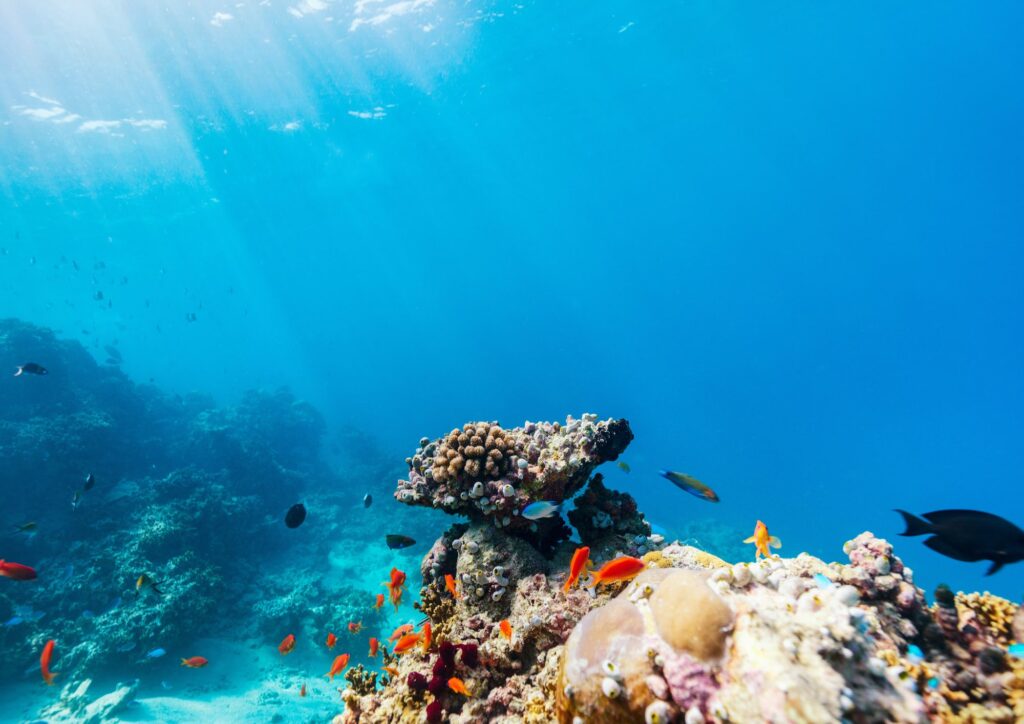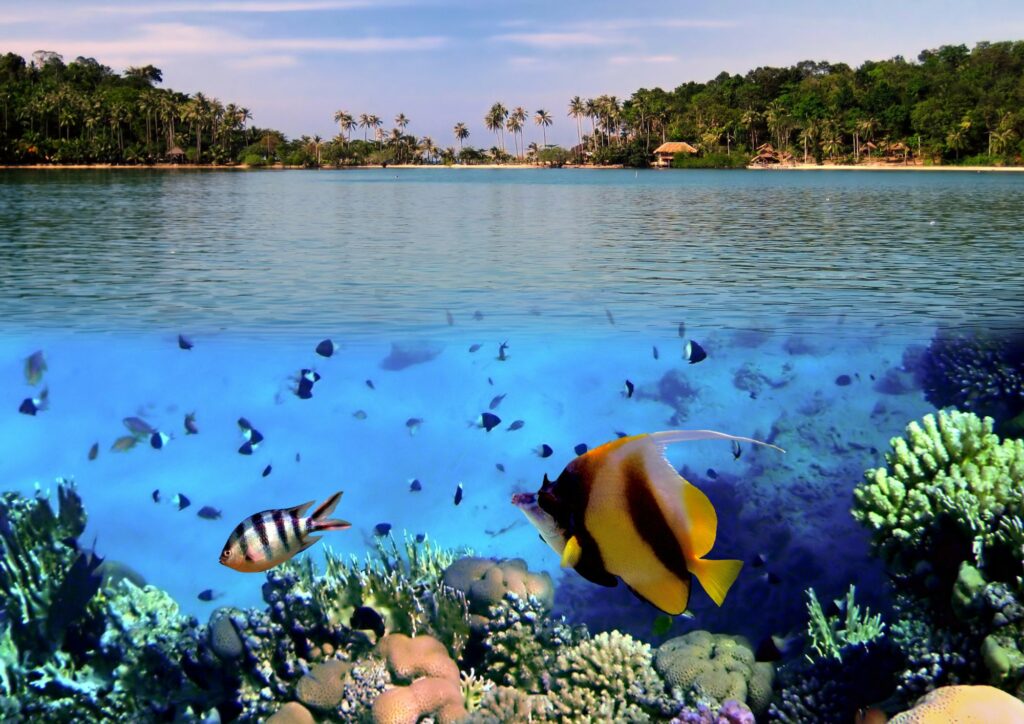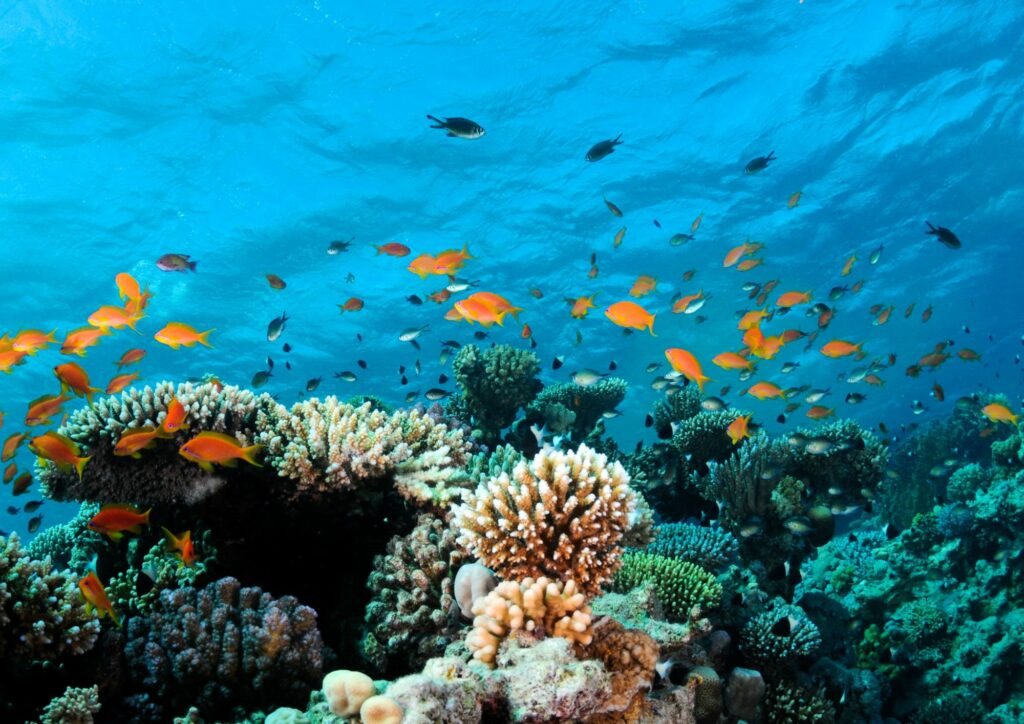The Coral Conservation in our beloved oceans are more than just vast expanses of saline water; they are replete with stunningly unique ecosystems under their surface like the technicolored world of coral reefs. However, increasing environmental threats are casting a grim shadow over these vibrant underwater landscapes. Alarmingly, coral reefs, the nexus of marine biodiversity, are being dealt the cruelest blows, leaving their teeming life on the brink of collapse. This calls for effective coral conservation efforts with quicker implementation. In this blog, we’ll take a sojourn into the extraordinary world of coral recycling, coral breeding, and coral restoration that can resuscitate the ailing marine life, bringing back its lost glimmers.
1. Taking Root with Coral Gardening in Coral Conservation

Coral gardening, essentially the agricultural practice of the sea, is a crucial element not just for marine biodiversity, but for the very sustenance of humanity. This captivating process in Coral Conservation mimics traditional land gardening, where coral fragments, somewhat akin to seeds, are tended to in nurseries. These are located in the ocean, thereby providing a controlled environment. The ‘frags,’ as they are colloquially referred to, come from resilient coral colonies that have proven to be survivors. The principle behind coral gardening is to offer a safe haven for corals to grow without the constant looming threat of predators, thus enhancing their survival chances substantially.
This exercise astounds us in the extraordinary manner in which it showcases the unity of diverse stakeholders. Marine biologists, conscientious local communities, responsible dive tour operators, and proactive governments all come together in a harmonious ballet of conservation action. They collectively strive towards the common goal – saving our distressed planet, one coral at a time, through extensive marine conservation efforts.
2. Breeding Hope: Coral Breeding for Coral Conservation

Coral breeding signifies the turn to a more vigilant and hands-on method for securing the conservation of coral species. In practice, this methodology takes corals and breeds them in lab conditions, preceding a well-planned transplantation into natural reefs. Marine biology researchers painstakingly collect coral eggs and sperm during specific time periods known as spawning events. These events herald the next stage of life for the corals. In controlled conditions, specific catalysts are added to promote fertilization, almost like a scientific cupid.
Once the coral larvae emerge, they are nurtured and cared for as they grow into polyps, the form they need to be in before their introduction to their natural habitat. This Coral Conservation process is key to accelerating coral reproduction, providing a numerical boost to the declining populations. It lights a beacon of hope against the dark anxiety about coral extinction.
3. Coral Restoration: The Road to Recovery for Coral Conservation
Coral restoration constitutes an extensive process spanning a gamut of activities aimed towards the rehabilitation of coral populations in degraded reefs. These activities include propagation, outplanting, consistently monitoring growth patterns, and the assessment of reefs while simultaneously promoting public and scientific collaboration. The simultaneous implementation of both coral gardening and coral breeding maximizes the chances of success in reef restoration. Education plays an integral role in this endeavor.
An informed public is a formidable force in the fight for survival of natural ecosystems. It’s vital to have comprehensive, easy-to-understand, tailor-made education programs that highlight the seriousness of coral and marine conservation. When people understand the interlinkages and become aware of the consequences of neglect, their participation can turn the tide in favour of a sustainable future. In essence, restoration reaffirms the collective human responsibility and ability to breathe life back into the rapidly deteriorating health of coral ecosystems.
The Future of Corals and Our Marine Heritage: A Conclusion
Restoring marine life to its original glory constitutes an urgent challenge that humanity needs to take up. It involves acknowledging the plight of our coral reefs and acting concerted towards their recovery. Coral gardening, coral breeding, and coral restoration are more than just conservation strategies. They are lifelines that can draw vibrant hues back to our graying seas. And while they do offer definitive solutions, the triumph of these stratagems lies in their successful and collaborative implementation. Together with marine biologists, local communities, governments, and perhaps, most importantly, an informed public, we can reignite the life in our seas, one coral polyp at a time for Coral Conservation.

I’m excited about the potential of coral breeding and restoration. It’s essential that we educate ourselves and others on the importance of marine conservation. Let’s work together to breathe life back into our coral reefs!
We’re thrilled to hear that you’re excited about coral breeding and restoration! At Gill Divers, we believe that education is a crucial step in the conservation process. We’re committed to providing opportunities for our divers to learn about and appreciate the ocean’s incredible ecosystems. We also recognize the importance of community involvement in marine conservation efforts. If you’re interested in learning more or getting involved with our initiatives, please don’t hesitate to reach out to us at Tel: +65 6734 9373 or Email: [email protected]. We’d be happy to have you join our mission to protect and preserve our coral reefs!
I’m impressed by the comprehensive approach taken in this post. The unity of diverse stakeholders is crucial in tackling the crisis facing our coral reefs. I hope to see more initiatives like these in the future.
Dear Kian Lim, thank you for taking the time to share your thoughts with us! We’re thrilled that our post resonated with you and appreciate your enthusiasm towards coral conservation. At Gill Divers, we believe that unity is key in tackling the crisis facing our coral reefs. Our objective is not only to educate people about coral conservation but also to encourage collaboration between marine biologists, local communities, governments, and dive tour operators. We’re glad to hear that you share this vision. If you have any further questions or would like to learn more about our coral conservation efforts, please don’t hesitate to reach out to us at +65 6734 9373 or [email protected]. Thank you for being a part of the movement to protect our marine heritage!
This blog post is a wake-up call for all of us to take action in preserving our coral reefs. It’s heartening to see the different conservation strategies being employed, from coral gardening to breeding and restoration.
Dear Amanda, thank you for taking the time to share your thoughts on our blog post about coral conservation. We’re thrilled to hear that it’s served as a wake-up call and inspired you to take action in preserving our coral reefs. At Gill Divers, we believe that every small step counts, and it’s wonderful to see people like you who are passionate about making a positive impact on the environment. We encourage you to continue exploring ways to support marine conservation efforts, whether through local initiatives or global organizations. If you have any questions or would like to learn more about our coral conservation programs, please don’t hesitate to reach out to us at Tel: +65 6734 9373 or Email: [email protected]. We’re always here to help and provide information. Thank you again for your enthusiasm and dedication to marine conservation! Best regards, Gill Divers.